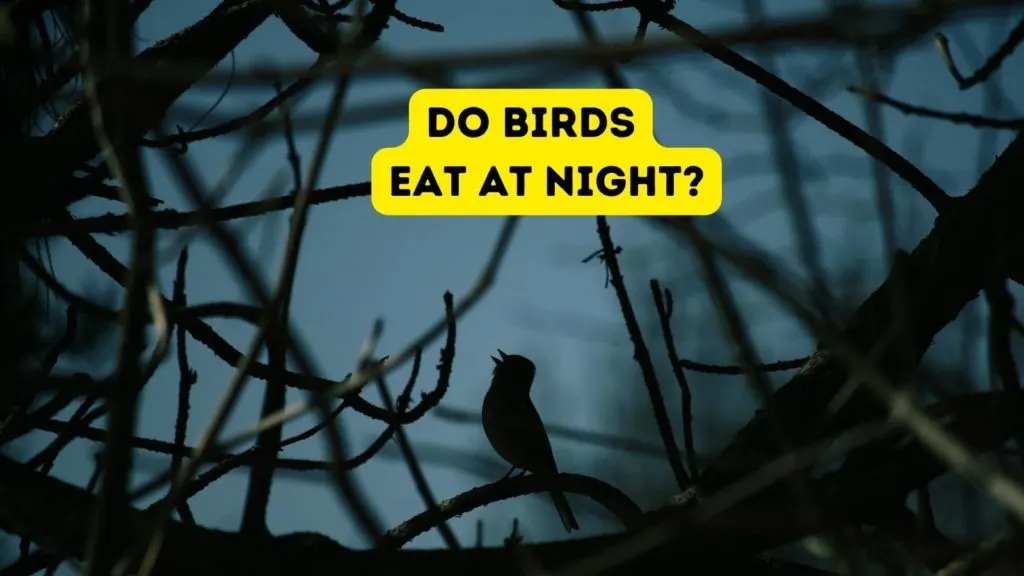For many backyard birders, understanding the behaviors of their feathered visitors can enhance the bird-watching experience and improve the success of their feeding strategies. A common question among enthusiasts is whether birds eat at night. Let’s look at avian nocturnal feeding habits, focusing on times that daytime birds may find themselves having a midnight snack!

Do Birds Eat at Night?
Generally, most birds are diurnal, meaning they are active during the day and rest at night. This is when they do most of their feeding, as their vision and the availability of their natural food sources are optimized. However, there are exceptions and specific circumstances under which birds that normally eat during the day might eat at night.
Eating at Night During Migration
Migration is a special circumstance that might alter a bird’s typical behavior, including feeding habits.
Some birds, especially those that undertake long migratory journeys, may feed at night. This behavior is partly because migration often occurs at night, when the air is cooler and predators are less active.
Birds such as sparrows, warblers, and thrushes might take advantage of brief nocturnal stops to refuel, eating insects or other available food sources to sustain their energy for the journey.
Night Feeding When Raising Nestlings
The feeding of nestlings presents another scenario where diurnal birds might extend their feeding hours into twilight or just beyond sunset, especially during the peak of the breeding season when days are longer.
Parents with hungry chicks may continue to seek food until the last light fades. However, this is not strictly considered nocturnal feeding but rather an extension of the day’s activities to meet the high demands of feeding their young.
Night Feeding by Urban Birds
Some urban birds feed at night, particularly in environments where artificial lighting and human activity create conditions that encourage or necessitate nocturnal feeding behaviors. Urban areas often disrupt natural light cycles, leading to increased nocturnal activity among certain bird species. Here’s how urban environments influence nocturnal feeding in some birds:
Influence of Artificial Lighting
Artificial lighting in cities can extend daylight hours, encouraging birds to continue their activities into the night. This phenomenon, known as “light pollution,” can alter the natural rhythms of birds, leading some species to feed, migrate, or communicate at night when they would typically be inactive.
Availability of Food Sources
Urban environments often have an abundance of food sources that are accessible at night, including trash bins, bird feeders, and insects attracted to lights.
Birds like pigeons, sparrows, and some species of gulls have adapted to these abundant food sources, showing increased nocturnal activity in urban settings.
Adaptation to Avoid Predators and Competition
In cities, where predator populations might be lower than in natural habitats, smaller birds can feed at night with reduced risk.
Furthermore, feeding at night allows some species to avoid competition for food with other birds and animals that are active during the day.
Specific Urban Birds Known to Feed at Night
- European Starlings and House Sparrows: These birds have adapted well to urban life and may feed at night, especially where streetlights or security lighting provide ample illumination.
- Gulls: In coastal and urban areas, gulls might feed at night, scavenging on waste and refuse or hunting for nocturnal sea life.
- Pigeons (Rock Doves): While generally diurnal, pigeons can adjust to nocturnal feeding, especially in well-lit urban areas where food is readily available.
Considerations for Urban Birding
For urban dwellers interested in observing or supporting nocturnal bird activity, consider the following:
- Minimize Light Pollution: Use shielded lighting and turn off unnecessary outdoor lights to reduce the impact on birds’ natural cycles.
- Provide Safe Feeding Stations: If you’re providing food for nocturnal birds, ensure the feeding stations are safe from predators and do not attract pests.
Which Birds Always Eat at Night?
Some birds have developed specialized adaptations such as enhanced night vision, acute hearing, and silent flight to navigate and forage in the dark. You might have these night visitors to your backyard:
Owls
- Great Horned Owl: Widespread across much of the Americas, this owl uses its incredible night vision and hearing to hunt prey ranging from rodents to other birds.
- Barn Owl: Known for its heart-shaped face, the Barn Owl is a nocturnal predator that feeds on mice, voles, and other small mammals, utilizing its exceptional hearing to locate prey in complete darkness.
Nightjars and Nighthawks
- Common Nighthawk: Feeding on flying insects, this bird is most active at dusk and dawn but also feeds throughout the night, especially under bright moonlight.
- Eastern Whip-poor-will: Named for its continuous, whistling calls, this bird hunts insects at night, using its wide mouth to capture prey mid-flight.
Other Nocturnal Feeders
- Chuck-will’s-widow: Similar to the whip-poor-will but larger, it feeds at night on insects and, occasionally, small birds and bats. We have these birds and their song always reminds me of summer!
- Black-crowned Night Heron: Unlike the predominantly insectivorous nightjars, this heron feeds at night on fish and aquatic invertebrates, using still waters to its advantage.
While most backyard birds do not typically eat at night, certain circumstances and life stages can lead to variations in this behavior. Understanding these patterns can help backyard birders support their local avian populations more effectively, whether through providing food, creating safe feeding environments, or simply observing and appreciating the remarkable adaptability of birds.
More Posts You Might Like
Why Do Birds Sing at Night: Unraveling Nocturnal Birdsong Mysteries
How to Attract Owls to Your Yard
What Do Birds Do During an Eclipse?
- Does Bird Seed Expire? - May 11, 2024
- How Big Are Baby Hummingbirds? - May 5, 2024
- How to Prevent Mold in Hummingbird Feeder - May 2, 2024
